SPOTLIGHT ON NURSING PROFESSIONAL DEVELOPMENT





Highlighting the work and contributions of Nursing Professional Development (NPD) across the Enterprise







Highlighting the work and contributions of Nursing Professional Development (NPD) across the Enterprise

Welcome to the Inaugural Edition of the Nursing Professional Development (NPD) Report. One of the key highlights of 2022 was the significant growth of our organization. We proudly welcomed a record number of Nurse Residents (537) and nursing staff (1,332) into our healthcare system. This demonstrates our dedication to nurturing emerging talent and investing in the development of our nursing professionals. In partnership with unit-based education leaders, we provide comprehensive orientation programs for new hires, ensuring that they are equipped with the necessary knowledge and skills to excel in their roles.
Moreover, our NPD Department has actively engaged in the advancement of existing staff members. We firmly believe that continuous learning and development are crucial for delivering exceptional care and achieving positive outcomes. Throughout the year, we collaborated with unit leaders to create a wide range of professional development opportunities. These initiatives included highly impactful orientation programs as well as specialized courses such as the High-Risk Infant Class, Preceptor Class, Charge Nurse Class, and Peritoneal Dialysis Class, and many others. By offering these courses, we aimed to enrich the knowledge and skills of our nursing staff, empowering them to provide exceptional care in their respective roles.
In our ongoing commitment to embrace innovation, we have leveraged cutting-edge technology to support learning. Our NPD team has incorporated blended learning strategies, including the use of short videos and interactive modules, to make education more engaging and effective. By utilizing these tools, we ensure that our nursing professionals have access to the latest developments and best practices in healthcare.
Looking ahead, it is crucial that we develop a diverse pipeline of staff members for nursing roles. To achieve this, our NPD Department actively collaborates with technical schools and nursing programs at all levels. We support students in their exploration of the pediatric specialty and offer guidance on precepting, teaching in classes, and considering nursing professional development as a potential career choice. Currently, we have students in many roles, such as Surgical Tech, Medical Assistant, Nurse Extern, Nurse Co-Op, Undergraduate Nursing Student, and Graduate Nursing Student. Through these initiatives, we aim to foster a culture of diversity and inclusivity within our nursing workforce.
As we reflect on the achievements of the past year, we are thrilled to share the impactful work conducted by the NPD Department. Our dedication to nursing excellence and continuous professional development has been instrumental in enhancing patient care and achieving positive outcomes. In this report, we will keep you well-informed about the latest developments within our programs. We will highlight the innovative changes led by our NPD team and provide valuable resources for your ongoing professional growth.
Thank you for your dedication and commitment to delivering exceptional patient care. Together, we will continue to strive for nursing excellence and make a positive impact on the lives of those we serve.
Kirsten Hickerson Larissa Hutchins Karen King Vice President Sr. Dir. Nursing Prof. Practice Dev Nurse Manager, Associate Chief Nursing Officer & Simulation Nursing Professional Development


This includes many different roles:
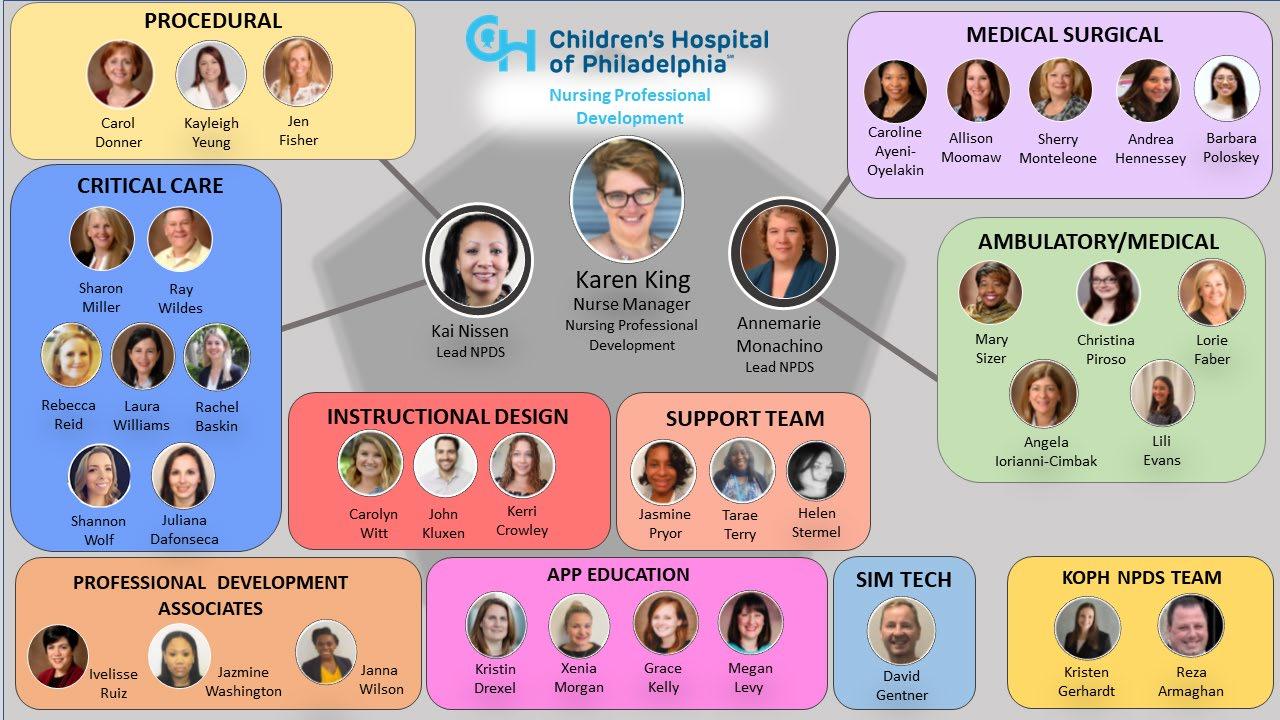
Nursing Professional Development Specialists (NPDS)

Instructional Designers (ID)
Meet Our Team:
Professional Development Associates (PDA)
Office Administrators
Simulation Technicians
NPD is comprised of a multidisciplinary team of professionals that collaborate in support of Nursing and Clinical Care Services (NCCS).

Oversees various crucial aspects of staff development, including orientation & onboarding, competency management, education, role development, fostering collaborative partnerships, and encouraging clinical inquiry. The NPDS must be a Master’s-prepared nurse.
Consults and collaborates with nursing colleagues to guide them in best practices for adult learning and educational design. Applies a systematic approach to plan and organize content, learning activities, training, and other educational assets (videos, virtual reality, infographics, animations, etc.).
Contributes to the overall functioning of NPD in a substantive, measurable way. PDAs support with educational design, project management, data collection, and more.
Specializes in both technologies and methods used in hospital-based training scenarios in conjunction with hospital team members who provide realistic training scenarios for medical personnel.
Provides administrative support for NPD, including wide-scale communications, student onboarding, and managing learner attendance & advanced reporting.

of our Nursing Professional Development Specialists hold one or more certifications


of eligible Nursing Professional Development Specialists hold the NPD-BC certification


Team Overview
KOPH is supported by 2 NPDSs:
• Lead NPDS: Kristen Gerhardt, MSN, RNC-NIC
• NPDS: Reza Armaghan, RN, MSN, CPEN, CEN, PHRN
These 2 NPDSs support all KOPH clinical staff, including RNs and Acute Care Techs (ACTs), as well as simulation education.
259 Nurses and ACTs in clinical units with hybrid model
Clinical Units:
Emergency Department (20 Beds)
934 Interdisciplinary CE credits awarded in FY23
25 Recorded lectures put in KOPH Learning Library
MedicalSurgical (28 beds)
0 Serious safety events in the first year of opening

(24 beds) Peri-Operative Complex (4 ORs + 20 PACU beds)

Nutritional Rehab/Gen. Peds (28 beds)
COMING SOON: N/IICU (18 beds)
KOPH opened in January 2022 without a dedicated Vascular Access Service (VAS) team. Data trend demonstrated multiple attempts to achieve peripheral access. There was a limited number of clinical staff that had ultrasound guided experience with the pediatric population. A comprehensive USGPIV training program was designed, developed and implemented to educate interprofessional staff across various clinical units.
• Learning Experience: a three-step educational process prior to attempting USGPIV insertion on a pediatric patient.
• Audience: ACTs, RNs, and APPs

• Preliminary Outcomes: indicate a relationship between the USGPIV program and a decrease in the number of PIV attempts on patients and the need for additional resource allocation for PIV placement.
ACTs and Behavioral Health Clinicians (BHCs) attend KOPH Support Staff Class. Topics include:
• Pediatric Assessment – Sick, Not Sick, & Communication with the RN
• Harm Prevention – Overview & Resources + KAPS

• Vital Sign Measurement
• Equipment Review
KOPH VAS Skills
The International Nursing Association for Clinical and Simulation Learning (INACLS) selected KOPH’s TheCreation of aMultidisciplinary, InterprofessionalUSGPIV Programfor a poster presentation?

• Hands-On Skills & Practice
• 123s of EKGs
• Escalation & De-Escalation Strategies
• ED – Overview & Skills
• KOPH Codes/CAT Calls
• Hands-On Skills Round Robin
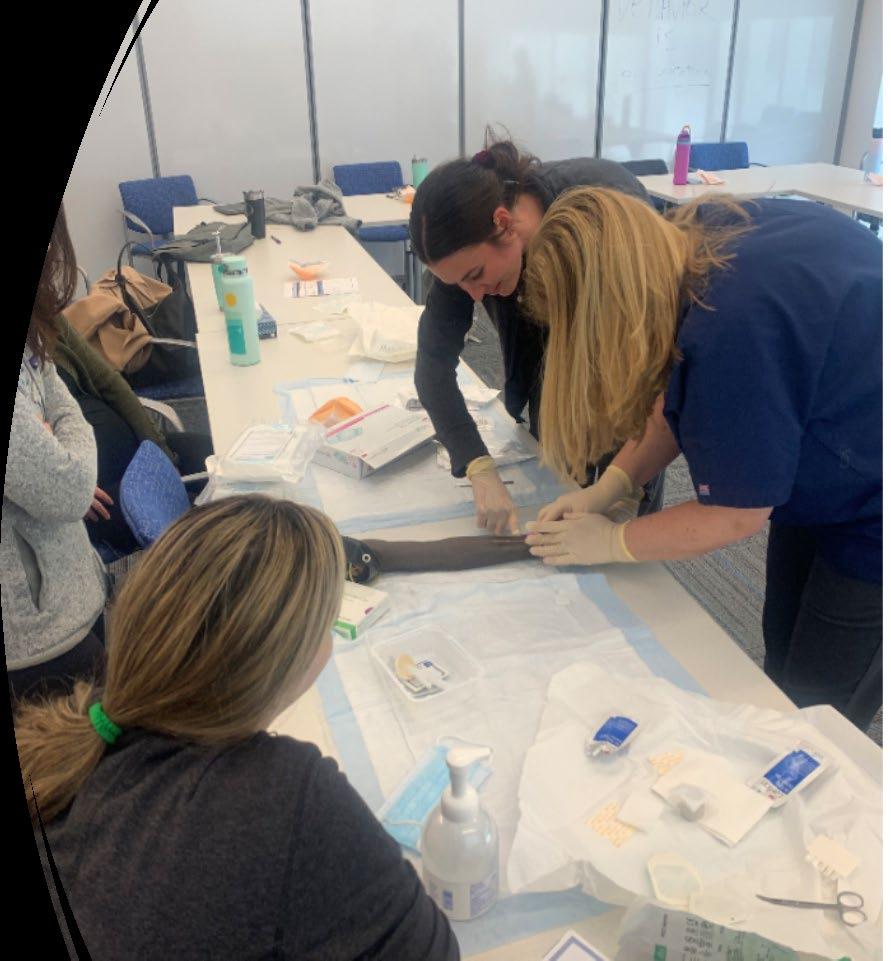
New Staff
This year the Procedural Team welcomed Kayleigh Yeung as a new NPDS. Kayleigh's clinical background is in perioperative nursing working in the CHOP Main OR for the last 10 years in the roles of Clinical Nurse, Clinical Supervisor, and Education Nurse Specialist.
New Programs
The Procedural Team supported many new programs in FY 2023. Here are a few:
• Standardized onboarding ASC Program
• Onboarding and equipment programs for ancillary staff
• Large program revisions: CCO, CNO, Peri-Op 101, SSO
• Skills Fairs: Brandywine, PACU, Voorhees

• Lunch and Learns: PACU, VAS
• GI Education Series
• Cath Lab Sterile Technique Education
• Dialysis Retreat
Team Overview
Three NPDSs work together to support many units and areas across the enterprise. See the chart below to learn more.
Shannon Wolf: Has worked in CHOPs ED for approximately 14 years prior to transferring to NPD. Has developed through many roles in CHOPs ED, including Nurse Extern, Nurse Technician, Clinical Nurse, CNE, and ENS.
Rebecca Reid: Clinical Nurse in CHOP CICU for 10 years, with 4 years as a CICU CNE. Additionally, has worked in PICU and NICU. Found her passion for education while helping other nurses learn life-saving equipment, and critical thinking skills necessary to survive in the ICU setting.
Juliana Dafonseca: New to NPD and CHOP! She has previous experience as a PICU RN at Yale New Haven, a research coordinator at Washington University St. Louis, and most recently a staff educator for St. Louis Children’s Hospital.
• Critical Care Orientation Revision: Part 1, Part 2, and Part 3
• Basic Rhythm Interpretation added to CNO
• NPD Central Classes revised: CRRT/PD, Neuroscience, Transplant, VAD

• Simulations: Transport
• Lunch and Learns: Cardiac Center
• ED Team: education for medication securement; low fidelity simulations
Team Overview
Rachel Baskin Sharon Miller Rebecca Reid Raymond Wildes Laura Williams Shannon WolfNew Staff
This year the Ambulatory Team welcomed Lili Sheridan as a new NPDS. Lili’s clinical background is in General Pediatrics, Rehabilitation, and Primary Care Nursing. Over the last 6 ½ years, she has been in the role of Nurse Resident, Clinical Nurse, and Primary Care Nurse. Lili is an experienced preceptor and educator that we are so excited to have join our team.
New Programs
• Ambulatory Orientation - revised in 2022 to include an in-person day and the CORE Series – 6 virtual 1-hour sessions
• Ambulatory Lead Nurse Education Series – new in May 2023
Team Overview
South Philly & NJ Primary Care Sites

Philadelphia & Montgomery
County Primary Care Sites
Delaware County Primary Care Sites
Bucks & Montgomery Country Primary Care Sites
Christina Piroso Mary Sizer Lili Sheridan Angela IorianniCimbak Lorie Faber 3E CSH Rehab Karabots Center Rehab MBUAdolescentNew Staff
Last year the Medical-Surgical Team welcomed Barbara Poloskey as a new NPDS.
Barbara’s clinical background is in Oncology, and she worked on the Inpatient Oncology unit for 3.5 years and the outpatient Oncology Clinic for 6.5 years.
New Programs
The Medical-Surgical Team supported many programs in FY 2023:
• Revisions to the Medical-Surgical Orientation Programs Sessions 1 and 2
• Teaching in CNO days 1 and 2
• Bronchiolitis JITT for the 5th-floor Main Hospital
• Code cart reviews 4E and 4 south
• Supported unit-based educators with skills fairs on 4E/4S & Nursing Operations (NOD)

• Clinical mentors to the new NPDS on 5 South/5WB, Oncology, 4E/4S & NOD
• Focused Nursing Transition Rounds to support the units
• Collaborate with unit-based ENS and NPDS for annual competency
• Reviewing unit-based orientation onboarding modules
• Equipment training
Team Overview
• 12NW
• 11NW
• NOD
• 3S
• 3E BMT
• Oncology Clinic (Buerger & Voorhees)
• KOPH Heme/Onc
• Day Medicine
• 8S
• 5WA
• 4S
• 4E
• 1E Obs.
• 9S
• 5S/5WB
Caroline Oyelakin Barbara Poloskey Allison Moomaw Andrea Hennessey Sherry MonteleoneThere are 3 Instructional Designers on the NPD Team.
Utilize knowledge, skills, and experience in Adult Learning Principles, Educational Design Models, and Best Practices for Engaging Learners
Work through the flow of content and evaluate the learning experience as a whole
Brainstorm novel ways to engage learners:
-In person
-Virtually -e-Learning
Work to organize content and make sure that all instruction, activities, assessments, etc. meet learning objectives
Offer coaching, consultation, and training on the blended learning process


Analyze course data and maintain course management systems
Create educational assets such as videos, 3D models, infographics, stations, and more








The NPDS/ENS Onboarding Educational Series was designed to assist the new NPDS/ENS in competently performing in the generalist facets of the NPD role by the end of orientation. The program uses a self-perceived assessment and an objective learning needs assessment to identify gaps in the competence of new to practice NPDSs & ENSs. Education is then provided based on the Association of Nursing Professional Development (ANPD) evidence-based Scope and Standards of Practice competencies.

Instructor: Dr. Kai Nissen
Day 1 Day 2 Day 3 Day 4
• Gap analysis
• Needs assessment
• Outcome identification
• Planning
• Implementation
• Coordination
• Facilitation of a positive learning environment
• Consultation
• Evaluation
• Ethics
• Education
• EBP
• QI
• Change management
• Leadership
• Collaboration
• Professional practice evaluation

• Resource utilization
• Mentorship and advancing the profession


2022 Summary:

Children's Hospital of Philadelphia is approved as a provider of nursing continuing professional development by the Pennsylvania State Nurses Association, an accredited approver by the American Nurses Credentialing Center's Commission on Accreditation.
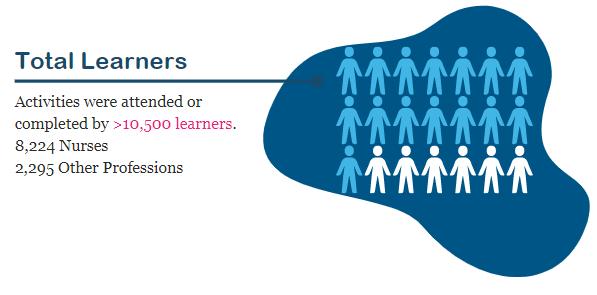



Accreditation ensures the rigor of your continuing education programs but seeking multiple accreditations adds layers and layers of complexity. And all that complexity takes additional time, resources, and experience to unravel.
That’s why our three founding accreditation organizations Nursing, Pharmacy, and Medicine (ANCC, ACPE, and ACCME) joined together to offer one path to joint accreditation for all your interprofessional continuing education programs for health professionals.
Fall 2022
• CHOP renewed as a Nursing APU for a 3-year accreditation (2022-2025)

51.6% of all CE activities in the last 18 months were interprofessional!
January 2023
• Submitted a list of all 552 CE activities from CME + PSNA from last 18 months
July 2023
• Application for JA will be submitted
December 2023
• Decision released
CHOP subscribes to Children’s Hospital Association’s Pediatric Learning Solutions, which is a library of pediatric nursing courses applicable to a wide variety of learners. These courses are offered free of cost to anyone with a CHOP email address and can meet your contact hour requirements for nursing licensure and certifications.


To learn more about PLS, click the logo to the right
Developed by pediatric subject matter experts in collaboration with experienced clinicians, each pediatric nurse course ensures accurate, evidenced-based content that aligns with current industry standards for nurses, respiratory therapists, and other clinicians caring for pediatric patients.
12,423
Available Courses
216 Course Completions in FY23
$0
Cost for CHOP Employees
Want to browse our PLS course library?

Click here or scan the QR code:

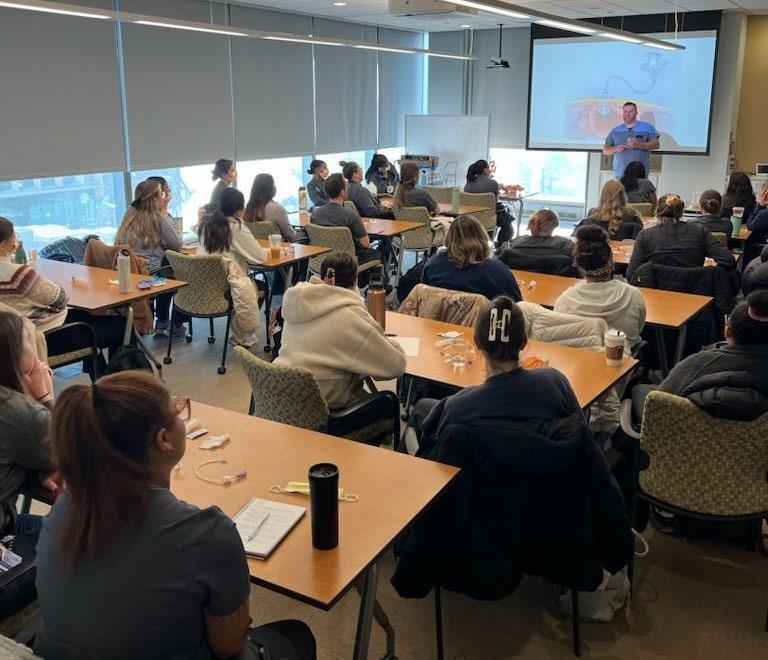

Program Overview
Central Nursing Orientation (CNO) is an enterprise-wide orientation program that includes didactic and hands-on content, reviewing basic arrhythmia recognition and response and medication administration. It is broken up into two sessions and includes pre-learning modules, pre-tests, and post-tests.
1,332 Nurses trained since FY22
Day 1
537 Were Nurse Residents Of those 1,332 nurses…
-Overview from leadership
-Harm prevention
Day 2
-Nurse Residency

-Medication assessment
-POCT & Restraints based on unit of hire
-Medication administration stations
-Basic rhythm interpretation stations (More details on the next page)
GOAL: Increase learners’ knowledge of safe medication administration, thus decreasing the number of medication errors.
SET-UP:
• 4 Stations
• Verbalize 6 Rights of Medication
• Perform medication administration utilizing Epic, Lexicomp, Policy Manager, & BCMA


• Pre-test and post-test to measure outcomes
GOAL: Provide education on standardized process for evaluating cardiac rhythms in CHOP inpatient & ICU settings.



SET-UP:
• Pre-learning module
• Hands-on Stations: for each rhythm, complete the 5-Step Rhythm Identification Process
• Activation of CHOP’s emergency response
• Pre-test and post-test to measure outcomes
Critical Care Orientation (CCO) program was revised in 2023 to reflect the changing needs of nurses new to clinical practice in pediatric critical, progressive, and emergency care. In collaboration with Education Nurse Specialists and clinical experts from these units, trends in current practice, evaluation data, educational outcomes data, review of literature, and stakeholder feedback was utilized to enhance, enrich, and revise the CCO program.
883 Nurses trained in FY23
5,441 Pre-learning modules completed
-Pre-learning modules
-Part 1: Sepsis & Respiratory (8 Hours)
-Part 2: Cardiac & Neuro (8 Hours)
-Educational Outcomes:
123 Learning videos watched
-Pre-learning modules
-Part 1: Care of Intermediate, Progressive, Emergency, & Critical Care Patient (8 Hours)
-Part 2: Progressive, Emergency & Critical Care (up to 2 Hours depending on role)
-Part 3: Critical Care (up to 2 Hours depending on role)

The revised CCO program integrated clinical judgement within the nursing core competencies to develop an integrated program, focusing on all components of the care of the patient. The program was divided into 3 classes, each class with content specific to patient populations with increasing acuity.
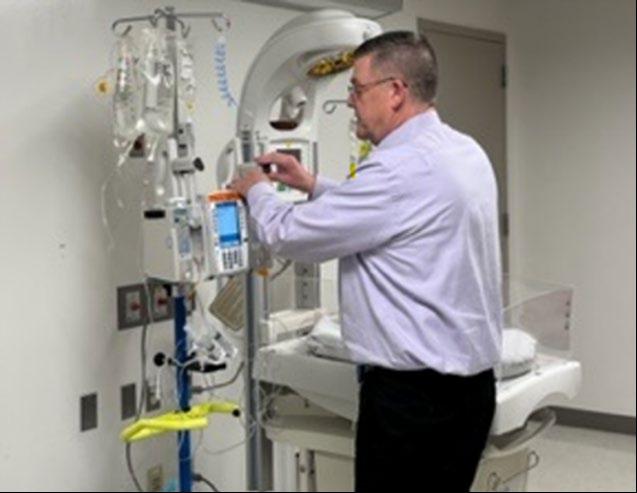



The Critical Care Team supported a critical care program almost every week, running 49 CCO classes in FY23!



The Medical-Surgical Orientation (MSO) program is designed to provide all new Medical-Surgical nurses at CHOP a standardized approach to learn essential care of medical-surgical patients. The training consists of modules, skillsbased classes, and simulation activities. The MSO program is undergoing revisions that will be implemented in FY24.
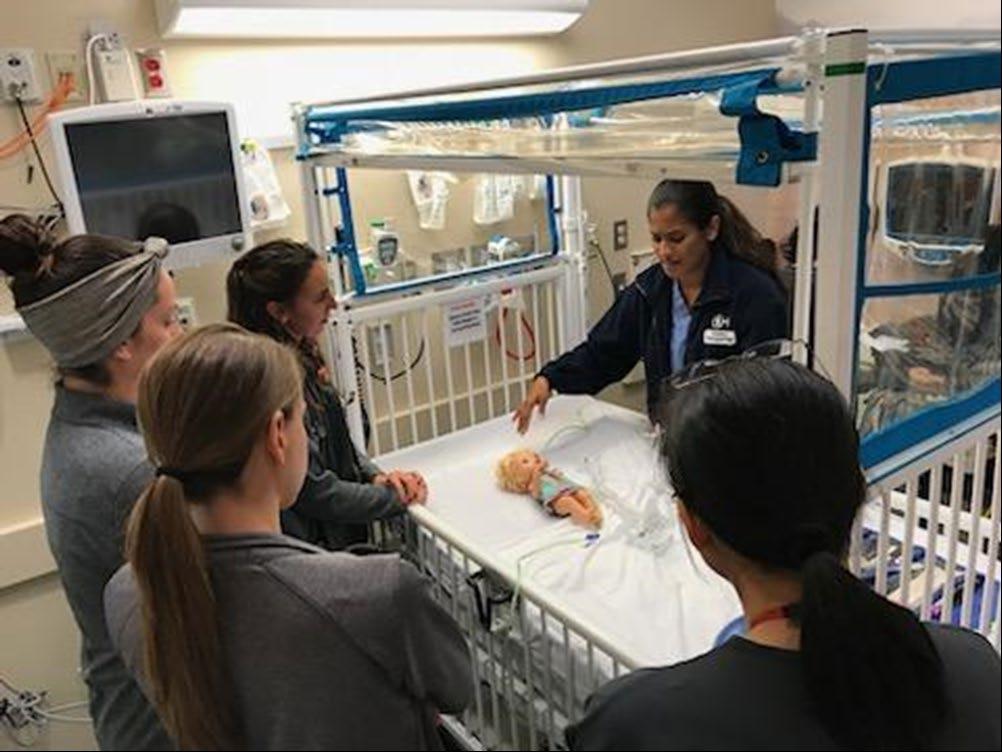
GOAL:
Safely care for patients with enteral tubes, central lines, and PIVs.
CONTENT:
• Enteral Tubemanagement and complications
• TPN – line management, set-up, and 2RN check

• Central line – care, contamination, disconnects
• PIV – assessment, complications, and retaping
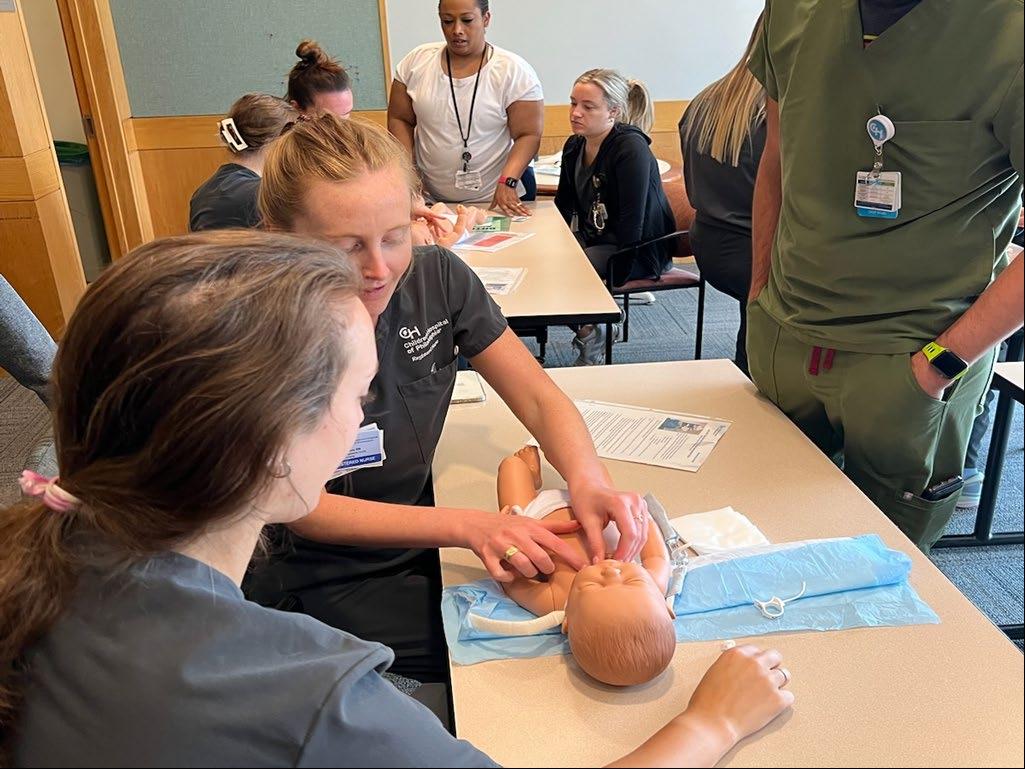



GOAL:
Safely care for patients with respiratory and seizure diagnoses.
CONTENT:
• Asthma
• Bronchiolitis and high flow nasal cannula
• NP/OP suctioning
• Non-invasive ventilation
• Neuro assessment
• Head circumference
• Seizure overview, cases, and treatment
Support Staff Orientation (SSO) aims to provide an overview of knowledge and skills necessary for successful transition-to-practice for new hire ancillary staff. Updated in July 2022, the program features a blended-learning experience that includes asynchronous pre-learning modules followed by instructor-led training.
The learning module program focuses on interactivity as the learner follows along with a participant guide and can even virtually navigate through physical spaces found at CHOP! It takes approximately three and a half hours to finish the modules allowing for more precepted clinical orientation time.
During the classroom component, participants can apply the concepts reviewed in the SSO module program in a safe learning environment. In-person instruction involves guest lectures from subject matter experts and hands-on skills training during a seven-hour day.
52
Learning Modules
• Senior Nurses Aides (SNA)
• Acute Care Technicians (ACT)

• Co-Op II/III Nursing Students
• PACU Clinical Support Associates (CSA)


• Nutrition
• Vital Signs
• Activities of Daily Living
• Safe Patient Handling
• Safety Observation
• Harm Prevention
• Infection Control & Prevention
Lectures & Skills
• Communication & Delegation
• Family-Centered Care
• Developmental Care
• Point-of-Care Testing
• Height/Weight/Head Circumference
• Safe Patient Handling
• Emergency Care
Based on feedback from unit leaders and participants, SSO will begin including vital signs into the training day starting June 2023 with the goal of providing an overview of best-practice concepts to be reinforced in clinical practice.


Ambulatory Orientation is a program for new nursing and medical assistant hires and applicable transfers to the Ambulatory setting.

Pre-Learning
1stWeekofHire
• Pre-test
• Two modules (~1.25 hours)
• Print and complete math pre-work
• 8.5-hour instructor-led training
LIVE Ambulatory Orientation
1st – 2nd Week
• Interactive Medication Safety Stations


• Infection Prevention
• Clinical Diseases
• Child Life
• Emergency Care Simulation
• 6 Synchronous, virtual 1-hour interactive webinars
• Occur every week on the same day and time (Tuesday, 10:30AM – 11:30AM) and can be completed in any order
• Each webinar offered every 6 weeks
Continuing Orientation & Realtime Education (CORE)
3rd Week
• Presented by Subject Matter Experts and NPDSs

• Breastfeeding
• Gender Affirming Care
• Health Equity and Social Determinants of Health

• Growth and Development
• Cultural Humility
• Delegation & Prioritization
• Working with Patients and Families
Post-Test & Program Evaluation
DID YOU KNOW?
• Completed after LIVE and CORE components
New hires have 6 months to complete the entire orientation program!
116 Learners in FY23
The Peri-Op 101 Program supports the education and development of the new-to-specialty Operating Room (OR) nurse. Formatted and based on the Association for PeriOperative Registered Nurses (AORN) Peri-Op 101: A Core Curriculum, the program consists of didactic, skills labs, and simulations geared to functioning in the role of circulator and scrub nurse in the intraoperative environment.

In January 2023, the first centralized Peri-Op 101 cohort successfully completed the program with eight nurses from the Main OR and Cardiothoracic OR. The program ran over five weeks with 15 days of facilitated learning and five clinical immersion experiences. Partnerships with the unit-based Education Nurse Specialists (ENS), Elisabeth Hertzler (Main OR) and Ashley McCarthy (CTOR), throughout the program proved effective in melding best practices with specialty-specific scenarios. All participants passed their final examination on the first attempt and entered their clinical orientation period to which they will complete their rotations within the next six to seven months.

The next cohort is planned to begin July 2023. New graduates will be included for the first time in a decade!
8
15 Days of facilitated
All graduates passed the exam on the 1st try with a 92% average – 7.7 points higher than the prior exam average!
5 Clinical experiences

NPD offers a variety of central programs to support the needs of nurses and support roles across the CHOP enterprise. These learning experiences are carefully designed to maximize class time and support learners, and are offered regularly throughout the year.


The NPD department provides a lot of support to Breastfeeding Education across the CHOP Enterprise. See below for a brief summary of the programs NPD partners with.
leadership nurses, experienced/influential nurses, or clinical nurse specialists, as it discusses
This one-day class provides neonatal nurses with evidence-based nursing knowledge and application skills regarding research on human milk and breastfeeding for vulnerable infants.

CRRT is used when patients experience kidney failure. A double lumen catheter is placed in a large vein to allow removal and return of a patient’s blood. The blood is pulled into a CRRT filter with a machine, such as Prismaflex or the new Carpediem, and then returned to the patient. The filter does the job of the kidneys, removing waste products and clearance of electrolytes or toxins. The circuit requires anticoagulation to keep circulating for the life of the filter, which can now be as long as 7 days for the Prismaflex machine.


139 Nurses trained in 2022
17 Classes offered in 2022
4 Modules
4-Hour Instructor-Led Training

-In-depth review
-Hands-on learning
-Common alarm simulation
Prismaflex
Program Overview
ECMO is used for patients that are critically ill, allowing the heart, lungs, or both to rest. This mechanical life support provides a bypass level of therapy next to the patient's critical care bed, oxygenating and sending blood throughout the body. Bedside nurses need to know their role to safely care for a patient on ECMO, working with the ECMO specialist.


Pre-Test
115 Nurses trained in FY23
1-Hour E-Learning Module
2-Hour Instructor-Led Training

-Discuss important concepts from the module
-Hands-on time looking at the circuit with the ECMO primer that teaches the class ECMO Circuit
Post-Test
The goal of the high-risk infant class is as follows: nurses will provide safe, developmental care to high-risk infants. This course is built in the eParamus tool, which helps ensure that programs are effective and achieve their intended outcomes. This year, the course underwent revisions. This included rewriting the learning objectives to reflect the needs of stakeholders, including the Bereavement Committee, and incorporating more group work for active learning. Currently, the course is being revised again to include asynchronous pre-learning as well.
183 Nurses trained in FY23

-Introduction to Developmental and Cue-Based
-Bereavement
-Understanding Families in Crisis
-Sensory Development in Infants: Implications for Practice
-Feeding and Swallowing in High-Risk Infants
-Positioning the High-Risk Infant

-Given 30 days after the program completes to measure knowledge retention
Program Overview
An interprofessional course for frontline leaders to improve communication skills, including coaching, feedback, and courageous conversations. This 4-hour live course is a prerequisite for Frontline Leader: Charge Nurse Role and Frontline Leader: Clinical Mentor Role.

144 Learners attended class in 2022

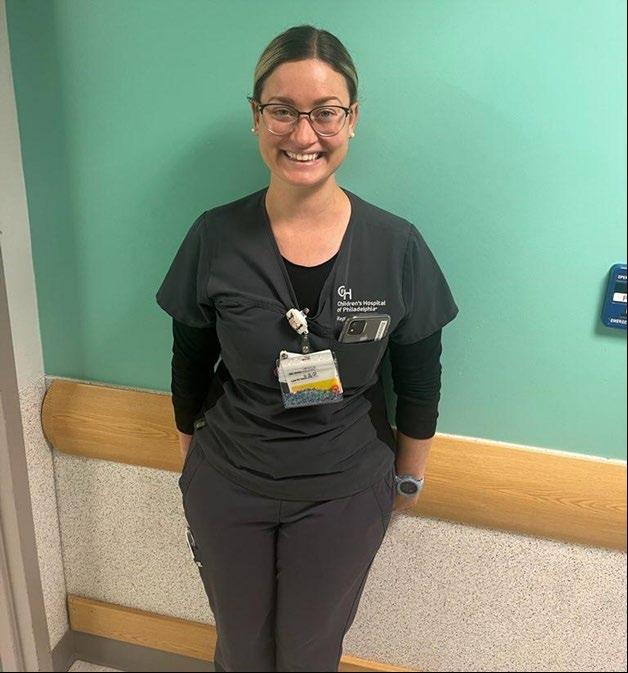


This 4-hour live course prepares interprofessional frontline leaders who will be in the Clinical Mentor Role to utilize communication techniques and integrate core competencies and the Synergy Model into the Clinical Mentor role
81 Learners attended class in 2022
NCCS: Frontline Leader- Charge Role Development is a professional development and leadership program that focuses on professionalism, communication, feedback, coaching, and delegation. It is intended to prepare nurses and respiratory therapists to work in the charge role as a frontline leader. By the end of the course, frontline leaders in the charge role will be able to coach, provide feedback, and engage in courageous conversations with colleagues and families. They will be able to provide leadership during emergency preparedness events and psychiatric emergencies. Finally, frontline leaders will identify how implicit bias may influence their role.
68 Learners attended class in FY23
Leadership
6 Classes offered so far in FY23
Supervision
Regulatory, Safety, & QI
Clinical Resource
Resource Utilization, Financial Stewardship, & Operations

This is a hybrid class is intended for all PICU and NOD ICU nurses. The course was developed in collaboration with the Neurosurgical and PICU teams. It is taught by experts in those areas. Content includes a comprehensive neurological exam, hydrocephalus, elevated intracranial pressure, how to care for neurosurgical patients, and the externalized drainage system (EDS). The course runs quarterly.

-Review and practice of comprehensive neurological examination


-Hands-on application of knowledge and skills reviewed in the prelearning
-Based on evaluations and feedback, revisions are made to this program. The last revision was in 2022.
In partnership with the Vascular Access Team, NPD trains bedside nurses, Acute Care Technicians (ACT), and Emergency Department Technicians (ED Techs) in PIV insertion. Once staff members complete this training, they must complete for 2 observations before they can begin independently placing PIVs in the pediatric patient.
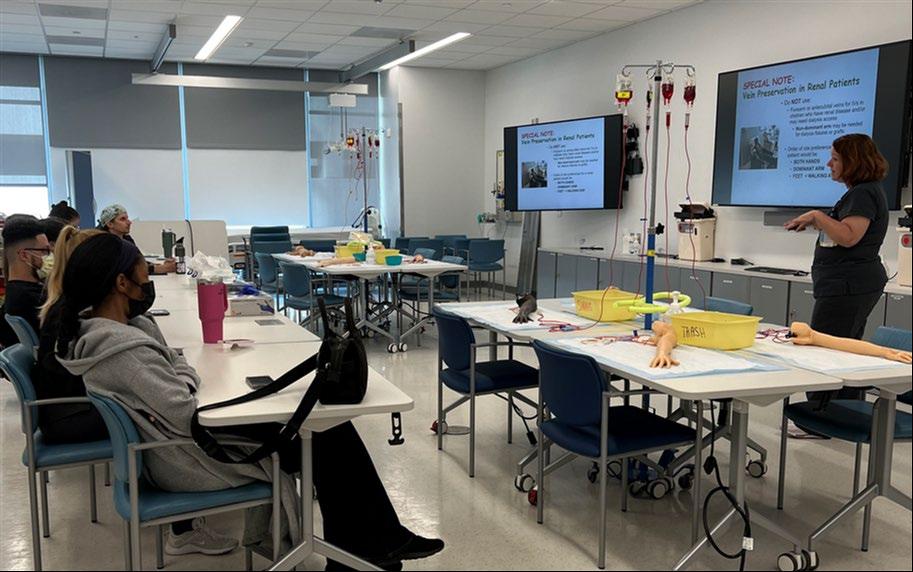


190 Learners trained in FY23
2 Hours of E-Learning Modules 1.5-Hours InstructorLed Training
-Review and practice placing PIVs in the pediatric patient
-Hands-on experience with feedback from expert instructors
2 Observations
-Attendees will be observed prior to being able to independently place PIVs
Peritoneal Dialysis is used when patients experience kidney failure. A tube or catheter is placed into the peritoneum and fluid may be instilled, absorbing extra fluid the patient may have, and then drained into a bag to allow clearance of electrolytes and byproducts. This instill, dwell, and drain of dextrose containing solution can occur over several days or overnight until the kidneys recover or until a transplant is available.



73 Learners attended class in 2022
2.5 Hours of E-Learning Modules
4-Hour Instructor-Led Training

-How to run PD cycler
-Manual PD
Baxter Cycler
-How to obtain cultures
-Ways to troubleshoot
Post-Test
This is a class for nurses who have built up a comfort level with CRRT and PD. It is designed to create “Superusers” of these devices to have a team of resource nurses on a shift to call when the need to troubleshoot arises. Annual competency is maintained through attendance of this class. Superusers must sign up to help with hospital wide CRRT and PD classes.

24 Learners attended class in 2022

-Advanced PD/CRRT topics
-Hands-on simulations
6 Classes offered in 2022
-Advanced troubleshooting of PD/CRRT devices
COMING SOON:
-Program revisions to begin summer 2023
-Centralized end-user and Superuser competencies
-New program to deploy by early 2024

This 2-hour interactive class based on adult learning principles was added to provide essential education to bedside preceptors based on feedback and data from orientees, nurse residents, clinical staff, and leadership. Content includes adult learning principles, feedback, teaching strategies, and assessment of the orientee.

2023
Feb. – Sep. 2022
Preceptor Basics developed for Cardiac Center and spread to additional units.
28 learners attended
December 2022
Course redesigned and added to Nurse Residency Seminar
11. Within 6 months,
90 learners attended.
Preceptor Basics course offered as a Central NPD program.

60 learners attended within first 6 months.
In 2023, NPD began offering the 2- hour Preceptor Basics course every other month, twice per day.


Safe Patient Handling Coach class is a hands-on session, promoting employee safety as patient handling tasks present a risk for musculoskeletal injury to all staff who perform them. Staff learn about safe handling practices and discuss real-life scenarios to raise awareness of how injuries could happen.
39 Staff trained as SPH Coaches in FY23
We also offer Coach Update Classes for staff who are already SPH Coaches are required to:
• Review data of employee harm


• Refresh skills
4 Classes offered in FY23 Roll Board

The Transplant Program has undergone some major revisions in the last year. Transplant Essentials (attended by all solid organ transplant attendees: Kidney, Liver, Heart, and Lung) is now an interactive online module that is completed prior to attending Transplant class. Next, each student receives pre-learning for each organ they care for. The total class time for the transplant program has been decreased from 6 hours to 4 hours.
~90 Nurses trained so far in 2023
Each unit has its own personalized program because of their unique needs (ex: the PICU does not care for heart transplants, so they do not have that education in their program, see below*).


• *Kidney- 5WA/ PICU
• Liver- 5wB/5S/PICU
• Heart- CICU/CCU
• Lung- 8S/CICU
3 Training dates remaining in 2023
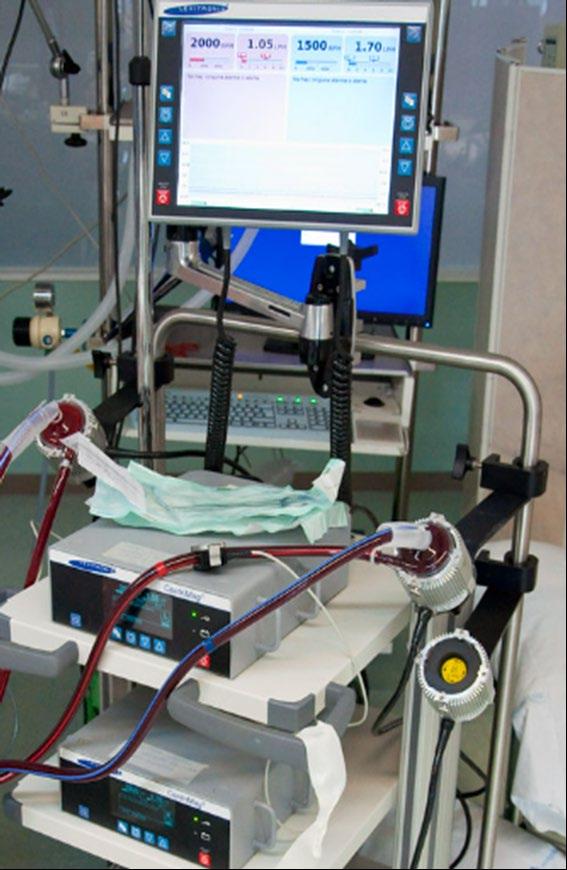

Ventricular Assist Devices are used for patients whose hearts are failing. These devices act as the pump of the body, taking over the work of the heart. Anticoagulation and troubleshooting are must-have knowledge when caring for a VAD patient. CHOP uses several different types of VADs including the Heartmate 3, Centrimag and Pedimag, Impella, and the Berlin. Nurses attending this class gain knowledge about each of these devices.


6-Hour Instructor-Led Training
-3 hours of teaching from VAD Coordinator, ENS, and Perfusion

-3 hours of handson simulation
-Review of several VAD devices
Are you passionate about teaching?
Would you like to earn PEAK points?
Are you looking for a new professional development opportunity?


It’s as easy as…
• Personal interest in sharing knowledge and expertise

• Not on a performance plan
• Ability to teach at least 4 times per fiscal year

• Manager/ supervisor approval required

• Click here or scan the QR code to fill out our form.
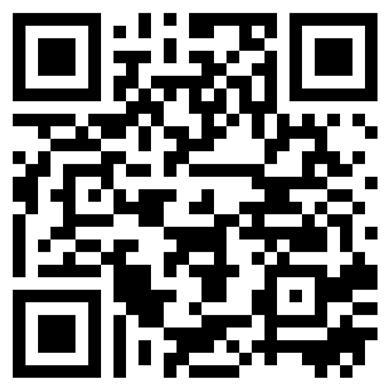
Come share your knowledge and help educate NCCS staff!
Ambulatory Orientation
CNO - EKG Recognition/Defibrillator
CNO - Med Safety Stations
Critical Care Orientation
CRRT/Hemofiltration
Frontline Leader: Clinical Mentor
Med-Surg Orientation
Nurse Residency
Peri-Op 101
Peritoneal Dialysis
PIV Insertion
Point Of Care Testing (POCT)
Restraints
Safe Patient Handling

Support Staff Orientation
Click here or scan the QR code to find out more!

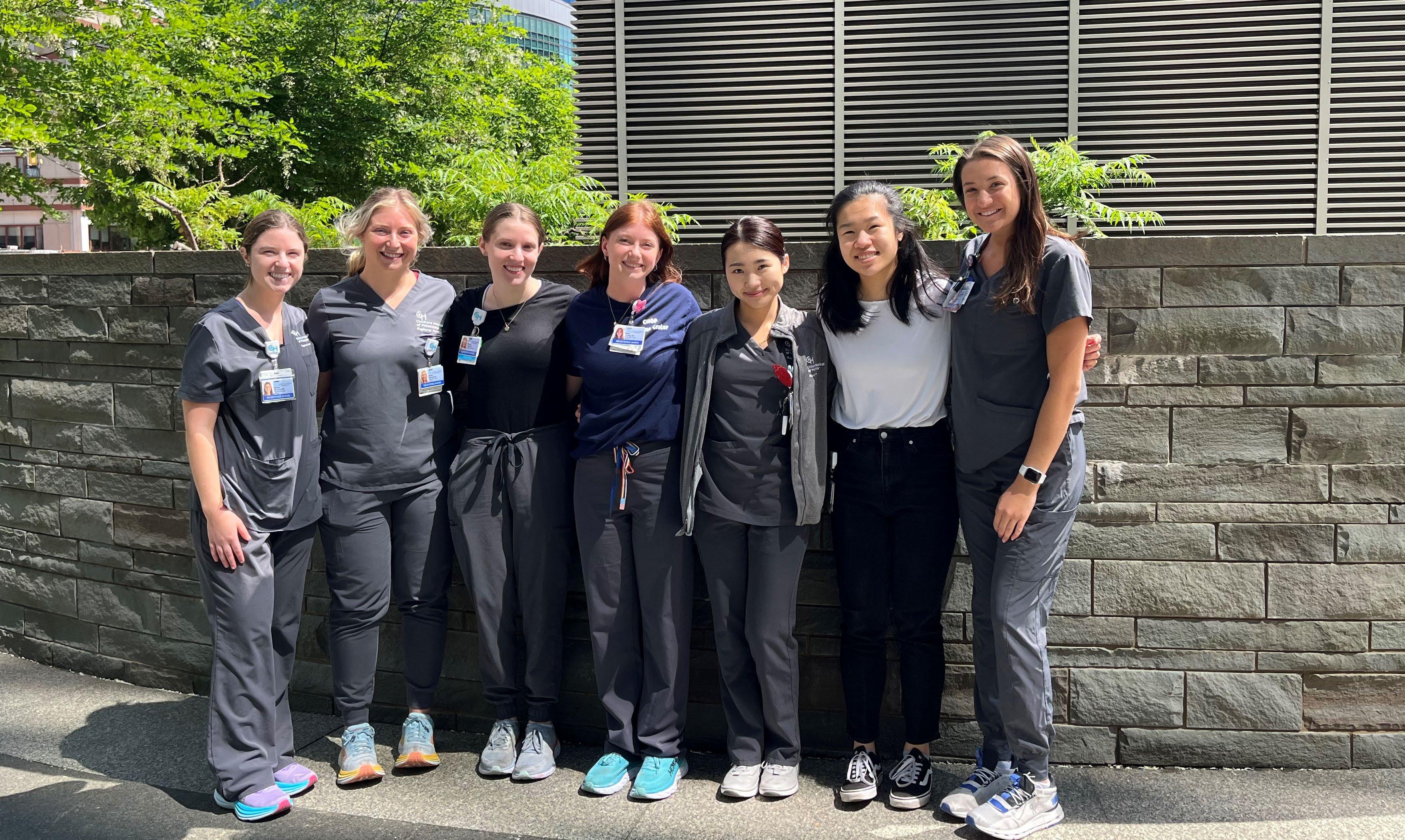
The mission of the CHOP Nurse Residency Program is to support the new to practice nurse as they transition from advanced beginner to competent nurses in their first year of professional nursing practice. The Nurse Residency Program strives to provide education on quality patient care outcomes, professional leadership and role development, and the use of evidence-based practice in everyday patient care.

In 2022, the structure of residency changed with 12 monthly four-hour seminars. In addition to the structure change, new content was added based on the data:
-EBP Project was re-designed

-Code Cart Review
-DEI
-Teach back
-QI Framework
-Volunteerism Virtual Scavenger Hunt
-Preceptor Class
-Resiliency in each seminar
-Leadership Panel
-Role of the Nurse in Safety
-Feedback
-Tips & Tricks when working with FLOCs.



In the Nurse Extern Program, students become acquainted with the pediatric clinical setting, apply academic knowledge to practice, work with nurse preceptors to provide hands-on patient care, and participate in educational seminars. The goal of the program is to develop a pipeline for future nurses while supporting the professional growth and development of nursing students

This year, the program runs 5/22 – 7/28

• Staff are hired as 0.9 FTE through the Nursing Operations Department

• The program consists of 3 seminars, weekly debriefings, assigned NPDS support, guided reflective journaling, pre- and post-surveys, social gatherings, and a program evaluation
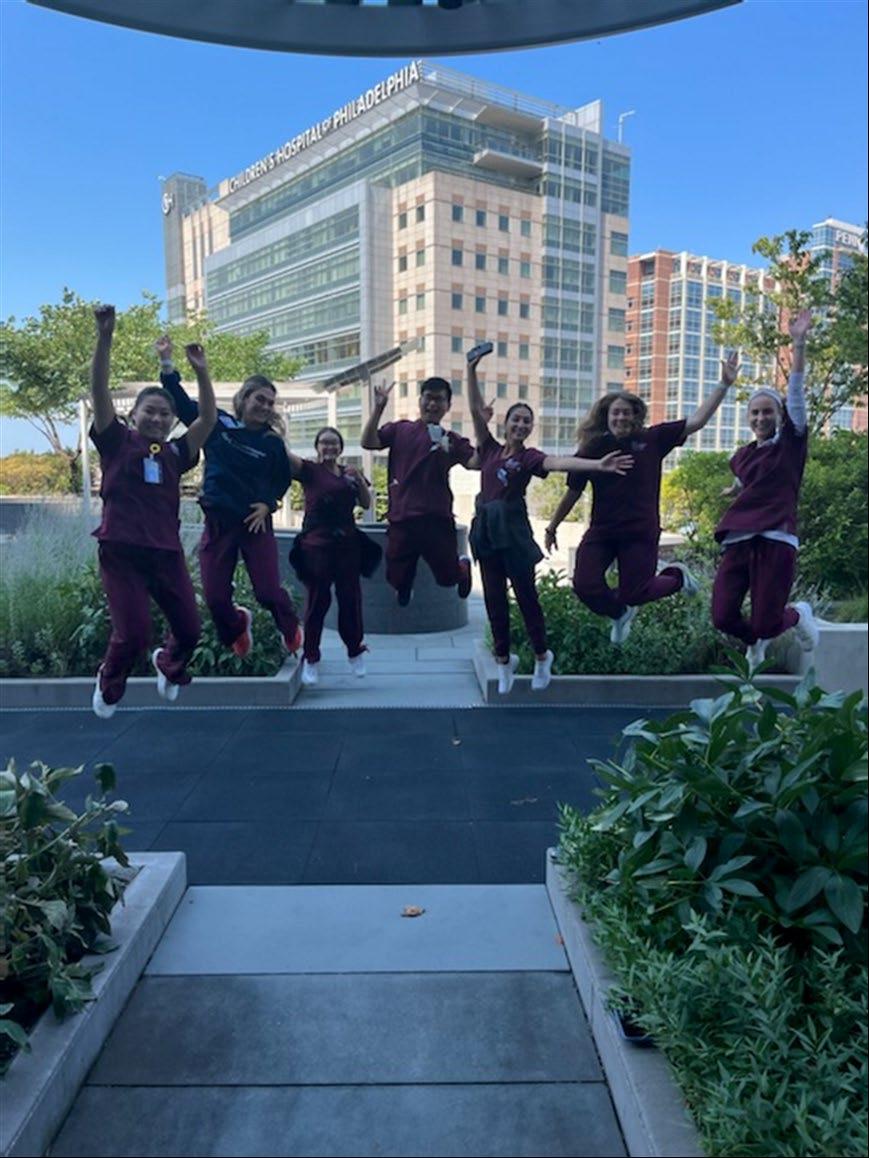

Each quarter, data is collected to identify how many Nurse Externs transition to Nurse Tech and Nurse Resident roles.
Our Nurse Extern Program is an exemplar many aspire to replicate. NPDS Jen Fisher presented and shared about CHOP’s Nurse Extern Program this year at the 2023 ANPD Conference.

95% Improved clinical thinking from reflective journaling







NPD at Children's Hospital of Philadelphia (CHOP) supports clinical placement of undergraduate, graduate and doctoral nursing students. Our goal is to provide clinical education to our students and build a pipeline for future employment. Many of our nursing students return to CHOP as employees.


Undergraduate and graduate student placement requests MUST go through NPD


Preceptors should not accept students without approval from NPD

Each school needs an affiliation (legal) agreement to have students placed at CHOP
3 NPDS, 1 PDA, & 2 Admins help support student placements at CHOP
Placement requests occur 3 times a year, but onboarding occurs on a rolling basis





NPD collaborates with units and departments regularly on a variety of educational initiatives. Here are some highlights from FY23.


Overview
NPD supported Just in Time Training (JITT) for nurses on 5S/5WB, 5WA, and ITCU. The need for education was evidenced by requests for educational support from unit Nursing Leadership. A professional practice gap was identified – nurses had a lack of confidence and preparedness in caring for bronchiolitis patients.


• JITT training was performed with expeditious education delivery, content review, and hands-on demonstration in partnership with Respiratory and CNSs
• Frequency – sessions held 4-5 days/week on all shifts
• Evidence-based content
• “On the spot feedback”
• Follow-up survey distributed 1-3 weeks after education
Implementation
• QR codes used to track attendance

• Mannequin demonstrations
• Printed and laminated resource guides
• Optimal times for teaching determined with unit leadership
• Rollout began 11/15/2022 and concluded 12/13/2022 due to saturation
150 Learners Attended
25 hours of education provided

Did attending JITT impact the care you will or plan to deliver to a patient with Bronchiolitis?
If an employee will be using a piece of equipment on or with a patient, they must have an orientation on how to safely use that equipment. Regulatory agencies required a process for training to be tracked for all new employees in all nursing departments. NPD collaborated with unit-based education specialists, CNSs, and clinical nurses as well as nursing unit leaders to develop checklist on multiple pieces of clinical equipment in clinical units and departments.

Some equipment requires that the employee demonstrate they can use the equipment. A Qualified Trainer must observe the employee and document in the Learning Management System that the employee completes each step.
• 74 checklists were created with step-by-step requirements
• >450 Qualified Trainers (QTs) were trained by Subject Matter Experts or other QTs to document the employee’s return demonstration
Unit/Department Equipment Lists
Each unit/department has specific equipment for their patient population and needs their own equipment lists.
• 83 unit/department checklists were created
Each employee needs a program: a combination of checklists based on their role, department, and hire date.
• 129 checklist programs were created
Annually, the NPDS and units collaborate to identify needs for staff education or competency. These topics are prioritized based on data that is high risk, new, or changing from safety reporting, surveys, initiatives, policies/procedures, and more. The NPDS checks in with their assigned units throughout the year to help develop methods for competency verification and evaluate the effect of educational strategies
Below is an example of the education and competencies developed for the Emergency Transport Team based on the FY23 needs assessment:
•Staff and leadership: collaborate & discuss staff education & competency needs

•Prioritize Needs: High Risk aspects of job

•Pre-learning assignment: Review literature & complete intubation e-learning
•Case Scenarios: Difficult airways during transport
•Pre learning: Checklists, videos, equipment for practice
•Demonstrate: intubation of neonate, child, & adult

•Simulation: Manage decompensating patient requiring intubation during transport with team

•Successful return demonstration of intubation, use of all ETT equipment, team management of difficult airway during transport
•For ongoing education & competency needs, implemented quarterly education including trauma, cardiac, neonatal, and

The Multicultural Leaders in Nursing Program was established in January 2022, which included 4 nurses. In 2023, there are 6 nurses in the program from various units within the hospital.
The program was designed to increase the diversity of staff nurses who self-identify as a member of a minority group who perceive themselves to be an underrepresented population of nurses at CHOP. The program includes educational tools to enrich learning and increase professional development. Program participants will shadow nurse leaders to increase their exposure to future opportunities.

• Nomination (by self or manager)
• 3 years of nursing experience and unit leadership requirement
• Overall performance rating > 3.0
The goal is for participants move into one of the following roles within 3 years: NCCS Shared Governance Chair, Nursing Supervisor, Hospital Operations and Flow Supervisor, Nurse Manager, or Safety and Quality Specialist.
Overview
CHOP has a long-standing professional partnership with the Villanova University Fitzpatrick College of Nursing (FCN) and therefore we are excited to announce the development of a Clinical Preceptor Professional Development Program.

This program will meet the specific educational needs of experienced Preceptors and Clinical Mentors at CHOP, while enhancing the relationship between CHOP and Villanova School of Nursing. This professional development for nurses is supported by the generosity of the Davis Foundation and our Nursing Professional Development Team.

Dates & Units
• Dates for first group: 3/20/2023 – 09/30/2023
• First units: Oncology and Cardiac Center
Highlights
• Awards 16 contact hours
• Awards a digital badge
• Awards a certificate of completion of this program
• Full access to Villanova’s library
• 1:1: mentoring with an FCN Nursing Faculty (3 times in 6 months)
• Four-hour simulation experience on campus in the Learning Resource Center
Once an individual successfully completes this 6-month program and 2 courses in a Villanova College of Nursing Graduate program of choice, FCN will waive the requirement of one 3-credit elective in that same program!


With the large numbers of new hires and novice nurses in the Oncology and Blood and Marrow Transplant Units, these oncology education sessions were created. The audience includes nurses, new to oncology, with up to 18 months of experience.
Planning occurred over six months in collaboration with Clinical Nurse Specialists, Clinical Nurse Experts, Oncology Attendings, Nurse Practitioners, and Speech Therapy from multiple departments including Oncology, Radiation, Rehab and Surgery. Learners completed a pre-test prior to each session, and then completed a post-test after each session to measure the learning that occurred. Evaluations and test data are still being analyzed.
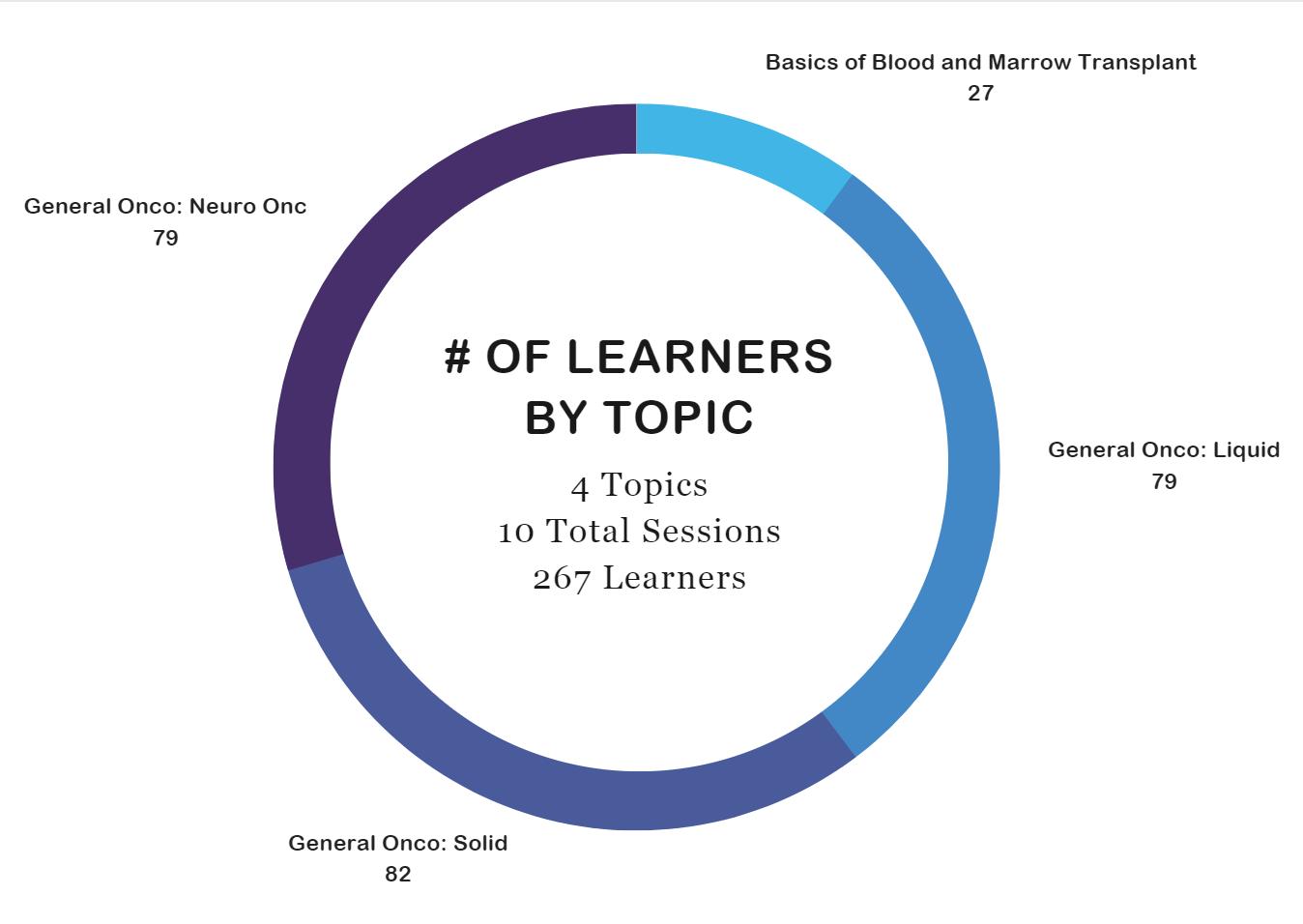

Unit-Based Collaboration
Multiple opportunities for ongoing education were provided in collaboration with unit leadership:
• Annual Oncology MIBG and BMT education for accreditation
• Code Cart Reviews in inpatient and outpatient Oncology and Day Medicine
• Oncology Clinic HACU Education
• KOPH Oncology Education Sessions
• Oncology Trach Education
• 5th Floor Respiratory Education
• Implementation of Serial Neurologic Assessment in Pediatrics (SNAP) Tool (QI Project)
• Oncology Safe Patient Handling Education

Units:
• 3S Oncology

• 3E Oncology & BMT
• Oncology Clinic
• Day Medicine
Oncology Trach Education

Rachel Baskin - Management of Distractions for Safe Medication Administration: A Multi-Site Study (Villanova IRB-FY2023-123) - Research Assistant and Co-PI
Kerri Crowley – Learner-Driven Extended Reality in Healthcare Education ALM Capstone Project, Harvard University (May 2023)
Rachel Baskin - Excellence in Nursing Practice Award, Sigma Theta Tau, Alpha Nu Chapter (April 2023)
Kerri Crowley: ALM, Digital Media Design – Harvard University (May 2023)
Graduate Certificate, Front End Web Development – Harvard University (December 2022)
AnneMarie Monachino: Post-Doctoral Fellow, The Helene Fuld Trust National Institute for EBP in Nursing and Healthcare (July 2022-July 2023)
NPD-BC: Raymond Wildes, Laura Williams, Andrea Hennessey, Angela Iorianni-Cimbak, Jennifer Fisher
NPD had the opportunity to participate in and present at the following conferences:
- Association for Nursing Professional Development (ANPD)
- ANPD Certification Class Review
- Association of periOperative Registered Nurses (AORN)

- Association for Talent Development (ATD)
- Black Nurses Rock (BNR)
- International Virtual Reality and Healthcare Association (IVRHA)
- John M. Templeton Jr. Pediatric Trauma Symposium
- Joint Accreditation (JA)
- Magnet
- National Teaching Institute & Critical Care Exposition (NTI)
- NEA-BC Class Review
- Nursing of Children Network (NCN)
- Vizient AACN Nurse Residency Conference
Bartlett, T.R., Biazus-Dalcin, C., & Baskin, R.G. (in press). Through a PhD program and beyond: The ripple effect mentorship model. In N.R. Gantz & T. Hafsteindottir (Eds.), Mentoring in nursing through narrative stories across the world. Springer: New York
Baskin, R.G., Biazus-Dalcin, C., & Bartlett, R. (in press). Editorial: The time for mentoring is now. Journal of Psychosocial Nursing.
Baskin, R., Lengetti, E., & Mariani, B. (2022, March). NLN Mentoring Toolkit. https://www.nln.org/docs/defaultsource/default-document-library/nln-mentoring-toolkit2022.pdf?sfvrsn=91c51d41_3
Cates, M., Dunn, J., & Reid, R. (2023). Cardiovascular system review. In M. Godshall & E. Warren (Eds.), Pediatric CCRN certification review: Comprehensive review, plus 300 questions based on the latest exam b lueprint. New York, NY: Springer Publishing Company.
Monachino, A., Yanez, A. (2022). Just-in-Time Training Programs. In Maxworthy, J.C., Epps, C.A., Okuda, Y., Mancini, M.E., & Palaganas, J.C. Defining Excellence in Simulation Programs Second Edition. Wolters Kluwer.
Overbaugh, K., Monforto, K., DiGiacomo, P., Maloney, C. (2022). Understanding COVID-19’s impact on nursing students’ education, professional perceptions, stress and coping. Nursing Education Perspectives, 43(6), E47-E49.
Reid, R. acknowledged in: Pieciak, K, McGowan, K, Grade, L, et al. Nurses’ perceptions and use of near infrared spectroscopy in paediatric cardiac intensive care. Nurs Crit Care. 2022; 1- 8. doi:10.1111/nicc.12861
Selekman, J., Monforto, K., & Selekman, D. (2023). Violence towards and by youth, Part I: Looking for the “whys.” NASN School Nurse, 38(2).
https://doi.org/10.1177/1942602X231154549
Selekman, J., Monforto, K., & Selekman, D. (2023). Violence towards and by youth, Part II: Recommendations for violence interventions in the school setting. NASN School Nurse, 38(2).
https://doi.org/10.1177/1942602X231154547
Faber, L and Poloskey, B. (2023) CNO: Medication Administration.
Fisher, J. (2023) An Extern Program Redesigned to Grow Your Pipeline. 2023 ANPD Aspire Convention Atlanta, Georgia.
Fisher, J. (2023) Nasogastric Tube Educational Outcomes.
Monachino, A., Widmeier, K., Erbayri, J. (2023). Teaching Teamwork and Communication Principles Using a Maze Activity. Children’s Hospital of Philadelphia 6th Annual Interprofessional Education Symposium.
Monachino, A., Widmeier, K. (2022). Teaching Teamwork and Communication Principles Using a Maze Activity. Philadelphia Area Simulation Consortium.
Monachino, A., Faber, L. (2022). Teaching Teamwork and Communication Principles Using a Maze Activity. Nursing of Children Network’s 19th Annual Regional Pediatric Nursing Conference. Wilmington, DE.
Monachino, A. (May 25, 2023). New Nurse Manager Orientation. Transforming Healthcare through Evidence-based Practice 2023 Summit, Fuld National Institute for EBP, Columbus, Ohio.
Montelone, S., Piroso, C., Moomaw, A. (2023). Can You Hear Me Now? A Feedback Tool. Vizient AACN Nurse Residency Conference.
Nissen, K. (2022). Effecting Aseptic Practices in the Cardiac Cath Lab. Educational Outcomes.
Nissen, K. (2022) Evidence-Based Practice Immersion Presentation: Operationalizing a needs assessment during the onboarding of nursing professional development specialists.
Oyelakin, C. & Faber, L. (2022). Case Examples of Clinical Instructor Feedback. Nursing of Children Network’s 19th Annual Regional Pediatric Conference. Wilmington, DE.
Poloskey, B. (2022). Evidence-Based Practice Immersion Presentation: Hazardous Drug Safe Handling Best Practices for Caregivers of Oncology Patients
Reid, R., Wolf, S., King, K., Miller, S., D’Aprile, Bernard (2023). Nursing Grand Rounds: Rhythm Interpretation: The Progression of a Plan to Support Staff Education.
Reid, R., et al. (2023). End of Life Care in the Cardiac Center.
Sheridan, L (2023) Bronchiolitis Just in Time Training.
Sheridan, L (2023) Evidence-Based Practice Immersion Presentation: The Tiered Skills Acquisition Model in Nursing Orientation.
Williams, L. (2022). Evidence-Based Practice Immersion Presentation: Novice Preceptors.
Williams, S., Rust, D., Connelly, J., Monforto, K., & Witt, C. (2023). New ECMO Specialist Virtual Hybrid Training Program. Children’s Hospital of Philadelphia’s 6th Interprofessional Education Symposium.
Williams, S., Rust, D., Connelly, J., Monforto, K., & Witt, C. (2023). New ECMO Specialist Virtual Hybrid Training Program [poster presentation]. Specialist Education in ECMO, Gaineville, FL.
Wolf, S., Reid, R. (2023). CNO: Basic Rhythm Interpretation. Educational Outcomes.
Wolf, S., Reid, R. (2023). CNO: Basic Rhythm Interpretation. Nurse Residency Advisory Board.
Yeung, K. (2023) Centralized Peri-Op 101 Educational Outcomes.
Yeung, K. (2023) Evidence-Based Practice Immersion Presentation: New Graduate Transition to Independent Practice in Operating Room Nursing.